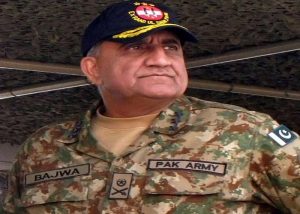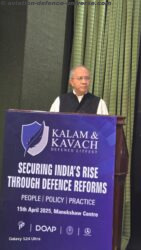By Jai Kumar Verma

New Delhi. 09 December 2019. The illustrious quotation about The Kingdom of Prussia that “it was not a country with an army but an army with a country” is fully applicable on Pakistan. Pakistani army ruled the nation either directly through different coups or created a façade of civilian government and governed the country through remote control.
The Chief of Army Staff of the Pakistan Army is the most powerful person in the country. Hence when Chief Justice Asif Saeed Khosa raised objections on the extension of Army Chief General Qamar Javed Bajwa all were surprised. There were speculations that army may overthrow the ‘selected’ Prime Minister Imran Khan. Large number of people in Pakistan believe that Imran Khan became Prime Minister as all powerful army selected him for this job. In past, six army chiefs either gave extensions to themselves or they extended their term through civilian governments without any objection.
In August 2019 more than three months before the expiry of General Bajwa’s term, Pakistan government issued a notification under which his term as army chief was extended for three years w.e.f. 28 November 2019. Government mentioned about the tense ‘regional security situation’ because of defanging of article 370 and revocation of autonomy of Kashmir. The on-going peace process in Afghanistan was also cited as a reason for the extension. However, Pakistan watchers mention that Imran Khan extended General Bajwa’s tenure so that his term passes smoothly as he is a protegee of General Bajwa.
The order was challenged in the supreme court of the country which asked uncomfortable questions and during arguments it also emerged that there is no provision of extension to army chief in the constitution or in the Army Act. Chief Justice Khosa also stated that the justifications given by government are “vague’. He also pointed out that if there is threat to the regional security than the full army has to face the threat and in that case the role of an individual will be very limited. The court also ruled that the government should pass a legislation in parliament within six months. The legislation must define the reasons for giving extension to an army chief’s service, tenure and other essential terms and conditions. The court’s judgement was unprecedented as so far, no hearing was done in connection of extension to the army chief.
It will not be easy for Imran Khan to pass the act from both houses of Parliament as Pakistan Tehreek-e-Insaf has majority in the lower house but in the senate the opposition party has the majority.
The Judiciary was emboldened to act against the extension of army chief as seven Lieutenant Generals are opposing the extension of General Bajwa. The Lt. Generals include Corps Commander Multan Lt Gen Sarfraz Sattar, Lt Gen Nadeem Raza, Lt Gen Humayun Aziz, Lt Gen Naeem Ashraf, Lt Gen Sher Afghan and Lt Gen Qazi Ikraam. In case of three-year extension to the current army chief about 24 Lt. Generals would retire which will include few Lt. Generals who were aspiring for the top job. Lt. General Sattar was the senior most general and would have become the chief on 29 November after the retirement of General Bajwa. He served as Defence Attache in India and his name was also forwarded by General Raheel Sharif for the Chief of Pakistan Army before his retirement.
The disgruntled army generals are behind filing the case against Bajwa’s extension. Few days before the extension to General Bajwa, a case was also filed by a retired army officer claiming that General Bajwa was an Ahmadi, which means he is a non-Muslim hence he is ineligible to become the chief of army staff. Later the petition was withdrawn, however another petition was filed in which the legality of the extension was challenged. Although the petitioner withdrew the case, but the court dealt the case and first it appeared that Justice Khosa would pass orders against the extension but at the last stage, the court gave six months’ time to get a legislation from the parliament.
The present case was filed by the person who in past filed cases in favour of army while this time he filed the case against the army chief. It is also an indication that he filed the case on behest of discontented army generals.
Maulana Fazal-ur-Rehman President of Jamiat Ulema-e-Islam (JUI) also announced Azadi March on behest of the malcontent army generals. Although several political parties requested JUI president to postpone the Azadi March, but he insisted that the March would commence in October few weeks before General Bajwa’s original retirement date. It was apparent that Maulana Fazal-ur-Rehman’s ‘Azadi March’ is connected with the extension of the army chief and although he was asking for the resignation of Prime Minister Imran Khan, but the real target was General Bajwa. It is also certain that if General Bajwa does not get the extension it will be very easy to dethrone Imran Khan.
Maulana Fazal-ur-Rehman also dared to reject the request of General Bajwa not to organise the March. In past politicians always accepted the request/directive of army chief because of the powers army chief possess. Maulana disregarded General Bajwa’s request because he had the backing of dissatisfied army top brass. Not only this when he terminated his Dharna he mentioned that there will be a big change in the months of December or January. It also indicates that he got this information from his mentors in the army.
The leaders of opposition parties also put a two-week Dharna in Islamabad and demanded the resignation of Imran Khan. The opposition leaders claimed that Imran Khan won July 2018 parliamentary elections as the authorities rigged the elections. Although the press is afraid of writing anything about the army but ‘social media’ is full of stories about the dissatisfaction in the Pakistan army about the three years extension to General Bajwa.
It is also contemplated that General Bajwa would resign within six months and will not wait for passing of the legislation in his favour by parliament. Firstly, it may be difficult to get it passed from parliament and secondly the extension has become controversial and has lowered the prestige of the high office. In last whether General Bajwa resigns or stays for three years will unfold soon but it damaged the image of Pakistan army which claims itself as the saviour of the country. The internal dissension in the army also came on the surface and the fact that army generals are involved in the intrigues is also exposed which is very damaging for any disciplined organisation.
(Jai Kumar Verma is a Delhi-based strategic analyst and a retired senior intelligence officer. He is also member of United Services Institute of India and Institute for Defence Studies and Analyses. The views in the article are solely the author’s. He can be contacted at editor.adu@gmail.com)


































































































































